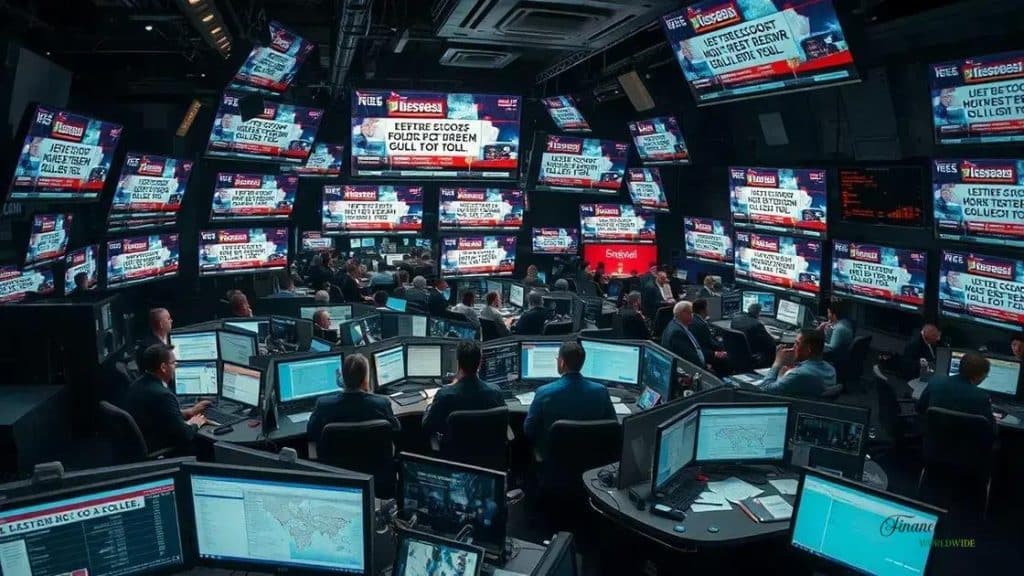The rise of misinformation in news media is alarming

The rise of misinformation in news media is a pressing issue that requires enhanced media literacy, critical evaluation of sources, and effective verification tools to ensure accurate information consumption.
The rise of misinformation in news media poses a significant challenge to how we consume information today. Ever wondered how false narratives can affect public opinion? Let’s dive deeper into this crucial issue.
Understanding misinformation and its origins
Understanding misinformation and its origins is essential in today’s digital landscape. With rapid information sharing, distinguishing truth from falsehood can be challenging.
What is misinformation?
Misinformation refers to false or misleading information shared without malicious intent. This can include incorrect facts or exaggerated claims. Often, individuals spread misinformation unknowingly.
Origins of misinformation
Many factors contribute to the spread of misinformation. These include:
- Social Media: Platforms like Facebook and Twitter can amplify unchecked claims.
- Anonymity: The ability to remain anonymous online encourages reckless sharing.
- Confirmation Bias: People tend to believe information that aligns with their existing beliefs, contributing to the spread.
- Lack of Media Literacy: Many individuals struggle to evaluate the credibility of sources.
As misinformation spreads, it often creates confusion and fear. For instance, during health crises, like the COVID-19 pandemic, various false claims about treatments circulated widely.
Moreover, when misinformation is packaged attractively, it can seem more trustworthy. Emotion-driven headlines often grab attention, leading people to share without verifying the facts. Therefore, it’s crucial to approach news critically.
Understanding misinformation allows readers to navigate the often turbulent waters of today’s media. By questioning sources and seeking evidence, individuals can combat the spread of false claims. In turn, this promotes a more informed public.
The impact of social media on news accuracy

The impact of social media on news accuracy is enormous. Today, many people turn to platforms like Facebook and Twitter for their news updates. This shift raises critical questions about how news is consumed and shared.
Rapid information spread
One of the most significant ways social media affects news accuracy is through rapid information spread. News can go viral within minutes, regardless of whether it’s true or false.
- Information overload: Users are often bombarded with more news than they can process.
- Verification challenges: The speed of sharing can outpace the fact-checking process.
- Engagement-driven content: Posts that generate emotional responses tend to get shared more, regardless of their accuracy.
However, the same platforms that can spread misinformation also offer tools for verification. Users can check facts through links to reliable sources. When news organizations utilize these platforms for genuine engagement, they can improve accuracy.
Despite these tools, misinformation persists. Factors like sensational headlines grab attention but often mislead readers. Many users click on articles without reading them, leading to spreading incorrect information further. It’s vital for users to critically assess the content they encounter.
Peer influence also plays a role in how news is consumed on social media. When people see their friends sharing a post, they may be more likely to accept it as true, even if it isn’t. This social dynamic can lead to echo chambers where only certain viewpoints are amplified while others are drowned out.
In conclusion, social media is a double-edged sword in the realm of news accuracy. While it can spread news quickly, it also facilitates the spread of misinformation. By being aware of these dynamics, individuals can become more critical consumers of news.
Identifying credible sources in a sea of information
Identifying credible sources in a sea of information is crucial in today’s media landscape. With so much content readily available online, differentiating between facts and falsehoods can feel overwhelming.
Know the signs of credible sources
When assessing whether a source is reliable, look for certain indicators. Reliable sources generally have a heritance of authoritative content and a commitment to accuracy.
- Author qualifications: Check the author’s credentials to see if they have expertise in the subject.
- Publication reputation: Established publications usually follow strict editorial standards.
- References and citations: Credible articles often cite original studies or reputable sources.
- Objective tone: A balanced view, free from extreme bias, is a sign of a trustworthy source.
While these signs are helpful, it’s also essential to cross-check information. If multiple credible sources report the same facts, the chances are higher that the information is accurate. This method helps build a more reliable understanding of the topic at hand.
Social media complicates this further. While platforms like Twitter and Instagram are great for quick updates, they often lack the rigor of traditional journalism. When encountering news on social media, consider the source. Is it a known news outlet, or is it someone’s personal opinion? This distinction is vital to identify credible sources.
Moreover, utilize fact-checking websites. They can help verify claims and debunk myths that often circulate without basis. Websites like Snopes or FactCheck.org provide valuable tools to navigate misinformation. When in doubt, consulting these sources can clarify any uncertainties.
Ultimately, developing a critical eye takes practice. As consumers of information, we should continually question what we read and where it comes from. This effort not only strengthens our understanding but also contributes to a more informed society.
Combating misinformation: tools and strategies

Combating misinformation: tools and strategies is vital in today’s world. Misinformation can be harmful, affecting opinions and actions of individuals. Therefore, knowing how to fight against it is essential.
Effective tools for verification
Many tools are available to help individuals verify information. Utilizing these resources can greatly improve the accuracy of information shared.
- Fact-checking websites: Sites like Snopes and FactCheck.org provide reliable information on trending topics.
- News aggregators: Platforms like Google News collect stories from established sources, helping users find trustworthy news.
- Browser extensions: Extensions like NewsGuard can flag unreliable sites while browsing.
- Educational resources: Websites like MediaSmarts offer guides on identifying misinformation.
Moreover, exercising critical thinking plays a crucial role in combating misinformation. When encountering a claim, ask yourself: Is this possible? Does it make sense? What evidence supports it? This simple questioning framework helps to filter out dubious information.
Engaging with others also combats misinformation. Having discussions about the information you encounter can clarify misunderstandings. Sharing facts with friends and family raises awareness and promotes a more informed community.
Personal strategies for consumers
Implementing personal strategies when consuming news is equally important. First, diversify your sources. Relying solely on one news outlet can lead to biased perspectives. Explore various platforms to gather well-rounded viewpoints.
Also, take your time when reading headlines. Sensationalist headlines can mislead readers into jumping to conclusions. Reading the full article provides context and clarity before drawing conclusions.
Another helpful strategy is to pause before sharing information. Take a moment to verify it before passing it on. This habit helps break the chain of misinformation spread.
The role of media literacy in today’s society
The role of media literacy in today’s society is more important than ever. As individuals are bombarded with various forms of information, understanding how to critically evaluate media is essential for making informed decisions.
Defining media literacy
Media literacy refers to the ability to access, analyze, evaluate, and create media in various forms. It equips individuals with the skills needed to navigate the complex media landscape. In a world filled with information, being media literate helps discern credible sources from unreliable ones.
Importance of media literacy
Having strong media literacy skills is crucial for participating in today’s digital society. Here are some key reasons:
- Informed decision-making: Media literacy empowers individuals to make informed choices based on reliable information.
- Critical thinking: It fosters critical thinking, enabling individuals to question the validity of the content they consume.
- Combating misinformation: By understanding how misinformation spreads, people can better protect themselves from false narratives.
- Active citizenship: A media-literate population is essential for a healthy democracy, as it encourages informed public discourse and participation.
Moreover, media literacy is not only beneficial for adults. Teaching children early on how to evaluate information can create a generation of critical thinkers. Schools can play a significant role in nurturing these skills through dedicated programs and resources.
In today’s world, where social media often amplifies both truth and falsehood, understanding the role of media literacy is vital. It is essential for everyone to engage with media analytically and reflectively to foster healthy interactions with information.
Implementing media literacy education in schools and communities can significantly impact how future generations consume and share information. This shift can lead to a more informed public, better equipped to engage in societal issues.
In conclusion, addressing the rise of misinformation in news media is essential for a well-informed society. By enhancing media literacy, we can empower individuals to critically evaluate the information they encounter. Tools for verification and a skeptical mindset are vital in fighting misinformation. As we work together to share reliable sources and promote informed discussions, we can create a more transparent and trustworthy digital landscape. It’s our shared responsibility to ensure that truth prevails over falsehood.
FAQ – Frequently Asked Questions about Misinformation in News Media
What is misinformation?
Misinformation refers to false or misleading information shared without malicious intent, often leading to confusion and misunderstanding.
How can I identify credible news sources?
Look for signs such as author qualifications, the reputation of the publication, references, and an objective tone.
What tools can help combat misinformation?
Fact-checking websites like Snopes and tools like NewsGuard can help verify the accuracy of information.
Why is media literacy important?
Media literacy helps individuals critically evaluate the information they consume, enabling informed decision-making and reducing the spread of falsehoods.





